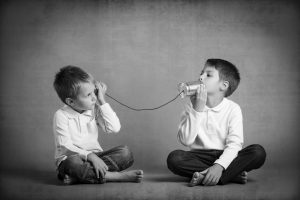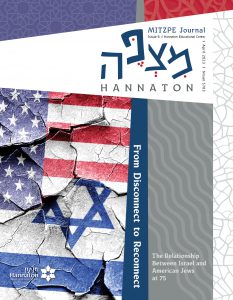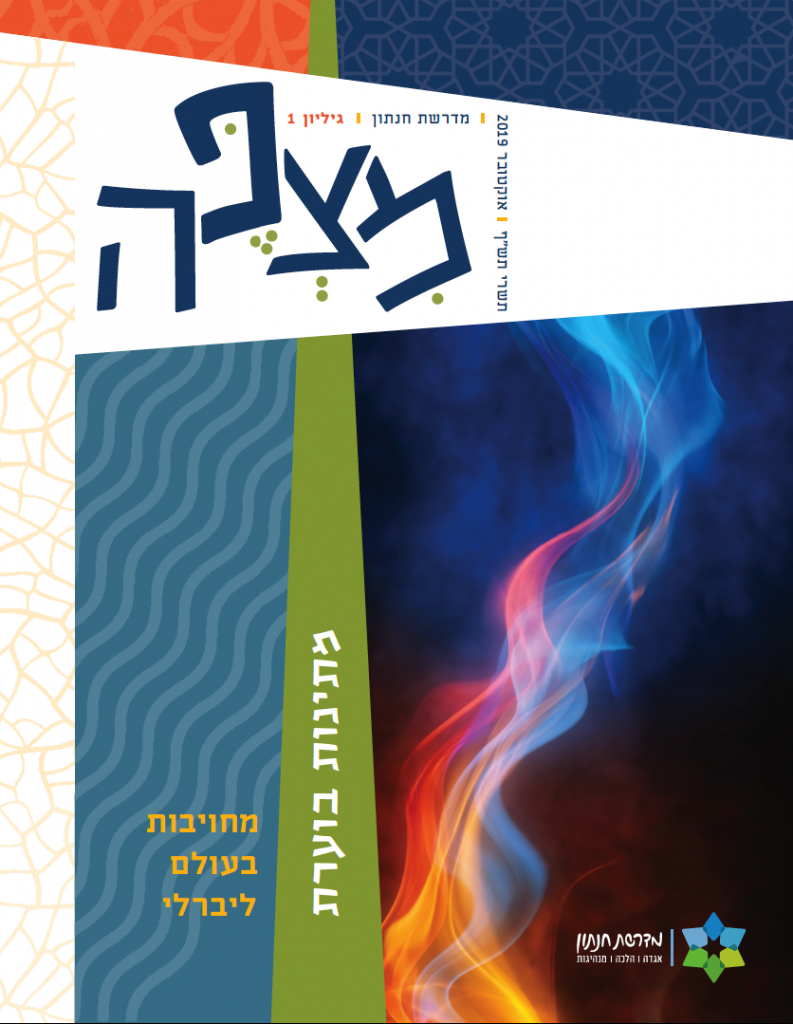Perspectives
In coming to understand the great, complex, profoundly meaningful challenge of the relationship between Israel and American Jewry, two events have had an influence on me. These events were somewhat extreme, but certainly not uncommon or marginal.
One of these experiences took place several years ago. I attended the funeral of a relative who, like my father, had immigrated to Israel from the United States, making his home and raising his family in Israel. At the funeral, his loving grandson delivered a eulogy in which he referred to the deceased as “a Holocaust survivor.” At first, I didn’t understand what he was talking about; I thought there must have been some mistake. A few moments later, I understood what he meant – and I couldn’t believe what I had heard.
In religious circles, I sometimes hear the term “silent Holocaust” used to describe the contemporary situation of American Jewry. This horrifying phrase assumes that there is no value to non-Jewish life, and that assimilation is no different than death in the gas chambers. Moreover, it assumes that there is no vitality, no creativity, no innovation, no reproduction of the Torah or of the Jewish people in the United States – so that escape from the United States and aliyah to Israel is the only conceivable future for a Jew.
There can be no doubt that assimilation is a deeply painful phenomenon that challenges us as a religion and as a people, and that poses a particular challenge to the Jewish people outside of Israel. We’ve invested the best of our mindpower, our resources, our educators, and our hearts in finding ways to deal with this reality, which only seems to grow more entrenched with the years.
Even putting aside the difficulty of using the word “Holocaust” here – putting aside the cheapening of the Holocaust that such a use entails – this expression paves the way to total detachment between the two communities. This is because our ways of thinking inevitably lead to real-world consequences. If we believe that American Jewry is lost forever, a story with a foregone conclusion, why should we focus our efforts there? All the more so, why should we attempt to learn what’s happening there? Quite the contrary – we need to avoid the dominant trends in American Jewry like the plague. From here on out, the stories of the two communities become disconnected from one another.
My unfortunate experience at the funeral exemplifies the vast distance between Israeli Jews and their American compatriots, and it reflects the dwindling of our ability to work together. How can we even start to explain ourselves to one another? Where can the conversation even begin?
My second experience took place 15 years ago, when I was a student at the Schechter Institute of Jewish Studies. We studied alongside American rabbinical students who were required to spend a year in Israel in the context of their studies. You can learn Torah anywhere in the world, but the connection to Israel, to Zionism, the marvelous and complex experience of being here – that you can only get in Israel.
I remember one conversation with an American student while we were learning about Tu Bishvat. I talked about the fruits of the land of Israel, about planting saplings, about the renewal of the holiday, and so on. He – my chavruta, my study partner – looked askance at me. For him, he said, the holiday had nothing to do with the land of Israel. It was a celebration of nature, of sustainability, a holiday that emphasizes our connection to nature and our responsibility for it, which we share with God.
I tried to claim that this was one of many ways of understanding Tu Bishvat, or perhaps an additional interpretation of the holiday, but he doubled down. From his perspective, there was no connection whatsoever between Tu Bishvat and the land of Israel.
This interaction, one of the most significant among many such moments, led me to realize that the distance between the United States and Israel can’t only be measured in miles; it’s a distance in thought, a distance in identity, a distance in narrative. Not everything in Judaism is connected to the land of Israel, but the creation of a Judaism in which the land of Israel plays no part is very dangerous indeed.
These two encounters represent two dangerous trends that are liable to lead to two separate stories: one for the Jewish people in the United States, and one for the Jewish people in Israel. As the stories grow distant, so too will our hearts – unless we understand the depth of the danger we face and the responsibility we have to combat it. In the face of these trends, we must act wisely.
If we want to address the issue head-on, our starting point has to be open dialogue. Not a one-time conversation or an angry polemic – those can often make the problem even worse. We must have an honest, brave, direct conversation in which we try to learn from one another, to engage in “disagreement for the sake of heaven.” We must aim to create a shared language and a shared way forward – a language and a way to write our story together, the story of the Jewish people and the State of Israel, now and forever.
A Covenant of Fate, a Covenant of Destiny
I wish to return to the terms brit goral (covenant of fate) and brit yeud (covenant of destiny) coined by Rabbi Joseph Dov Soloveitchik in his famous essay “Kol Dodi Dofek” (“The Voice of My Beloved Knocks”). I will make use of these terms, albeit in a slightly different fashion. With the help of these terms, I will attempt to clarify Soloveitchik’s view of the revival of Israel and the place of the Jewish people in this process.
What is the Covenant of Fate? Fate signifies in the life of the nation, as it does in the life of the individual, the existence of compulsion. A strange force merges all individuals into one unit. The individual is subject and subjugated against his will to the national existence, the existence determined by fate, and it is impossible for him to avoid it and be absorbed into a different reality…[1]
Today, is the existence of the State of Israel a kind of “covenant of fate” – a fact in which we happen to live, a challenge we have to struggle with? Perhaps today, 74 years later, the State of Israel is no longer understood as a miracle, as a dream come true beyond our wildest expectations, as a mission that unites the entire Jewish people – but rather as a mere fact of fate. Israel’s complex reality has ramifications for Jews all over the world because we are all one people. Sometimes, it seems that, at least for some people, the State of Israel itself is the greatest challenge to the existence of American Jewry.
On the other hand, we are also part of a covenant of destiny:
What is the Covenant of Destiny? In the life of a people (as in the life of an individual), destiny signifies an existence that it has chosen of its own free will and in which it finds the full realization of its historical existence. […] The nation is enmeshed in its destiny because of its longing for an enhanced state of being, an existence replete with substance and direction. Destiny is the font out of which flow the unique self-elevation of the nation and the unending stream of Divine inspiration…[2]
In which of these covenants do we find ourselves today? How does the younger generation, including a new generation of Jewish leaders, see the situation? We’ve undergone a dramatic revolution, leading to an era in which Jewry has a physical home and a state – and a Jewish people in diaspora. In the great center of Jewish life in the United States, our fellow Jews live in security and freedom; they have the capacity to learn and shape the Torah, maintain their Jewish identity, and even participate in the leadership of their country.
Do we still see the enormity of the miracle? Do we still understand the extent of the revolution? Are we committed to the welfare of the Jewish people as a whole, and to establish a connection between it and its land that will set the imagination aflame and strengthen not only Israel, but the entire Jewish people?
We cannot detract from the importance of historical awareness, nor what it means to lack historical awareness. Nonetheless, historical awareness is not enough. The real question is: What is the significance of the State of Israel today, in 2023? What is the place of the Jewish people in the story of the State today? This is the question we must grapple with.
Today, in the present generation, the State of Israel is forging its way forward. Perhaps the task of our generation is to determine what kind of state will be built here. Does this task belong only to those of us who dwell in Zion? Is the maintenance of a Jewish center in the United States a task that belongs only to American Jewry? Or do we bear a mutual responsibility, a shared destiny?
This question – a covenant of fate or a covenant of destiny – is tested not only on an intellectual or an emotional level, but on the level of action. Do we feel that we are partners in the fate of the Jewish people, in the image of our shared destiny? What do our actions in practice, both in Israel and in the United States, tell us about our story? Are we consciously building a shared story? Or, trapped in a reality that grows more complicated by the day, are we merely responding to it, creating more and more distance from one another? Sometimes it seems to me that we are like those Jews who try to bring others closer to Jewish life, but whose actions merely serve to push them away.
Difficult Conversation
In my conversations with American Jews, the question comes up: Is Israel the center of Jewish life today, or are there two centers, the United States and Israel, just as there once were Babylon and Israel? Or are there several centers, none more important than any other? I see Israel and the Jewish people as a body and a heart, in that neither can exist without the other. Each clearly needs the other – the other’s Torah, the other’s philosophy, the other’s love, the other’s help.
It is my good fortune that my Judaism has a creative and philosophical center in the United States; this is a fact for which I am grateful. This center enriches my life, and sometimes I feel that it has almost saved my Judaism. This is because pluralistic and Modern Orthodox Judaism in America are often more universalistic and more sensitive in their theology and philosophy than their parallel communities in Israel. Here in Israel, patriotism is a built-in element of our theology, which I also appreciate – because we have been given the task of building a Jewish, democratic, Zionist, and humanistic state. The fulfillment of such a task is possible, although not certain. This is the destiny I see before me.
In their book Difficult Conversations, Sheila Heen, Bruce Patton, and Douglas Stone define three chief elements of a difficult conversation: the facts (“what happened”), feelings, and identity. A difficult conversation tells us who we are, as individuals and as a society, which is why it causes feelings to run high. In other words, when I have a conversation with a friend on a subject related to my identity, I’m asking not only who my friend is but who I am.
The conversation between the Jewish center in Israel and the Jewish center in the United States is a difficult, complex one, because it touches on the essence of our identities. We need to know how to have conversations of this kind, and how to have them without forcing our interlocutors into polarized positions – Zionist or anti-Zionist, patriot or traitor, humanist or fascist, and so forth. A genuine connection between the two sides recognizes each side’s commitment to their opinions and even celebrates the existence of different positions. Our disagreement doesn’t hinge on a dichotomy of views – support or opposition to Zionism, the necessity of aliyah to Israel or the total negation of aliyah as a Jewish ideal. We need a much richer conversation, an argument that we can agree to keep having.
If we try to pinpoint the ingredients of such a conversation, we can define it as a conversation between liberal American Jewry and the State of Israel, and vice versa – between the State of Israel and liberal Jewry. The American Jew might say: When Israel stops being liberal and democratic, the connection between us will come to an end. This is because a regime of that kind is against my values and my identity, and I’m not willing to identify with a country that doesn’t represent me. In turn, the Israeli might say: If so, your love of Israel is conditional. What kind of a connection is that? [1]
[1] We could suggest a conceptual distinction between one’s relationship to the State of Israel, which is currently in a complicated and even dangerous political situation, and one’s relationship to Israeli society, which contains a far broader and richer spectrum of opinions and beliefs than those represented in the political sphere. However, the ability to distinguish between the two requires a certain level of commitment and closeness. Moreover, this kind of distinction cannot be sustained indefinitely.
One might think that the term “dual loyalty” describes a situation in which one loyalty clashes with another. In fact, however, dual loyalty describes a situation in which one loyalty contradicts another. Therefore, an American Jew can be a patriotic American citizen and a Zionist supporter of Israel without running into the problem of dual loyalty. American Jews have dealt with this question for a century now. We are capable of living with many different loyalties, as long as they do not contradict or cancel out one another. It would seem that the question of dual loyalty no longer exists with regard to the particular country in which I live, but rather with regard to myself as a person. If progressive American Jews feel that their identity contradicts their ability to be Zionists and/or supporters of Israel because Israel’s conduct is deeply opposed to their values – for example, with regard to the occupation or on issues of religion and state – this will inevitably lead to a rupture of the bond between us and a disconnect of the heart.
We haven’t reached this point yet, but it looms before us as a warning sign. Remember, a difficult conversation is one that challenges our identity as individuals, as a group, as a state, as a people. It’s not easy to have a conversation like this. But do we have any other choice?
Unconditional Love
Any love conditional on something – when the thing ceases, the love ceases. Love that is unconditional will never cease. What is an example of conditional love? The love of Amnon and Tamar. And of unconditional love? The love of David and Jonathan. (Pirkei Avot 5:16)
Can we achieve a love that is not dependent on Israeli politics, a love that supports all members of the Jewish people regardless of their views on Israel? It’s not easy. But just as in a family, not wanting to stay in contact or work on our relationship is a one-way ticket to division and detachment.
True, a covenant relies on the desire and the freedom of both parties to maintain it, and people and societies in pursuit of justice, truth, and peace are allowed to set down their red lines. But don’t forget that it’s always harder to see the complexities of physically and mentally faraway places than those of our own. Many Israelis believe that American Jews don’t understand the complexity of life in Israel. At the same time, Israelis themselves don’t understand the complexity of Jewish life in America, particularly liberal Jewish life.
Zionism arose so that we could step out of the beit midrash, stop waiting for the Messiah, and take our fate into our own hands. Today, with a state, an army, and an economy, it would seem that the Jewish people is far stronger than ever. The monumental challenge before us is not only to continue our existence as a state, not only to defend the state. Rather, it is to return to the beit midrash and learn together, to define our identities and our connection. Both sides have a share in this challenge, and we need to take hold of it with both hands.
Let’s insist that this beit midrash bring us together and not push us apart, and that it be able to contain our vast diversity. We must find a way to express disagreement with Israel without distancing ourselves from it, to create dialogue that makes room for mutual influence, to intervene respectfully, and to understand the various realities at play.
Israel must understand that if it is to deal with the challenges faced by the Jewish people, the Jewish people must be part of the conversation. The preservation of Israel as a Jewish and democratic state is a task for the entire Jewish people, not only the citizens of Israel. After two thousand years of exile and 74 years of Israel’s existence, we can say that we’re still only at the beginning of the road. Israel must understand that its internal arrangements with respect to religion and state – for example, the cancellation of the grandchild clause of the Law of Return, which is once again under discussion – don’t just impact its own citizens, but the entire Jewish people, and therefore they must be included in the conversation. We must keep in mind that mature, grown-up love isn’t a constant honeymoon. It means being willing to work on the connection and not giving it up.
The Role of the Streams of Judaism
The establishment of the State of Israel led to a dramatic change not only in the situation of the Jews, but in the nature, expressions, and characteristics of Judaism […] The historic importance of this change is no less profound than the change that took place after the destruction of the Second Temple and the emergence of rabbinic Judaism, a change that forged post-Temple Judaism. [1]
What characterizes this change? To what kind of Judaism will it lead? Will the gambit succeed? What will the Jewish people look like, and what kind of connection will exist between its constituent parts? In our day, Israel is shaping itself. This is a fateful moment for us, and we stand at a crossroads. In the past, we were asked to create a state as a home and a shelter for the Jewish people. Today we are asked to forge the character of the state, Israeli society, and the Jewish people – while continuing to struggle for the existence of the state.
After 74 years, two Jewish centers – Israel and the United States – have become the central forces in shaping the Jewish people, its way forward, and its Judaism. Many talented educators and leaders in the United States and other diaspora communities have devoted their work to Jewish education, Jewish identity, and the connection between the Jewish people and the land of Israel. We cannot overstate the value, creativity, and successes of these leaders.
However, at the same time, there is a new current of young, idealistic leaders who are unwilling to hold onto a complicated picture with love, albeit occasionally with a broken heart. These young people, who are slowly but surely disconnecting from Israel, may be part of the next generation of Jewish leadership. Perhaps this is the difference between us. We aren’t asking whether to continue together, but how to continue – while some American Jews have set a mirror to us, asking whether it’s worth it to continue at all.
The different streams of Judaism were founded in order to save Judaism and the Jewish people from assimilation. We could have stayed in the ghetto, we could have assimilated, but we understood that another way was possible. The streams have since become movements that have molded the Jewish people and taken responsibility for its continuation. These religious movements are necessary not only to facilitate man’s conversation with God, but also – perhaps primarily – to instigate processes of change within the Jewish people. As a Conservative rabbi, I believe that Conservative Judaism may have a supremely important role to play today: facilitating conversation and leading the way on various societal levels, from leadership to young communities. In order to fulfill this role, it must reach out beyond its borders.
I hope that Conservative Judaism will have the foresight to create a way forward for the entire liberal movements and to serve as a beacon of inspiration and meaning for the Jewish people.
We are living in an era characterized by the extreme polarization of individuals, opinions, and perspectives. There have always been disagreements, but today, more than ever, we are insulated in our own echo chambers and perceive those who oppose our worldviews as not only wrong, but dangerous. Within the culture that surrounds us, we must remind ourselves that “these and those are the words of the living God, but the halakha is in accordance with Beit Hillel […] Why was Beit Hillel privileged to have the halakha established in accordance with their opinion? Because they were agreeable and humble, and they would teach both their own statements and the statements of Beit Shammai. Moreover, they put the statements of Beit Shammai before their own statements…” (Eruvin 13b).
[1] Soloveitchik, J. D. (2006). Listen, My Beloved Knocks. Translated by David Z. Gordon. New York: KTAV Publishing House.
[2] Ibid.
[3] We could suggest a conceptual distinction between one’s relationship to the State of Israel, which is currently in a complicated and even dangerous political situation, and one’s relationship to Israeli society, which contains a far broader and richer spectrum of opinions and beliefs than those represented in the political sphere. However, the ability to distinguish between the two requires a certain level of commitment and closeness. Moreover, this kind of distinction cannot be sustained indefinitely.
[4] Ish Shalom, B. (2011). “A Theology of Sovereignty: Judaism at a Crossroads?” Akdamot 30, 9–21.





